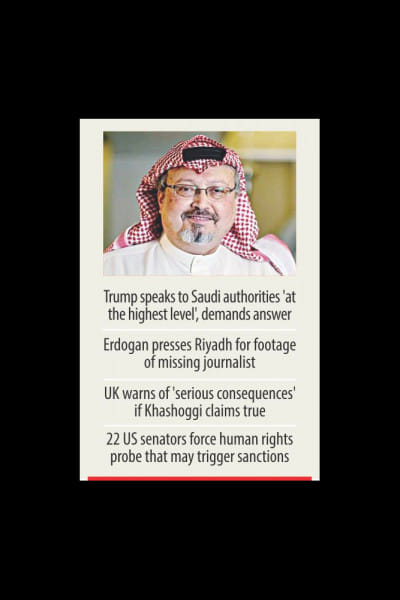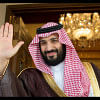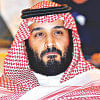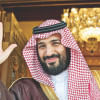Saudi crown prince ordered op

Turkish President Recep Tayyip Erdogan urged Saudi Arabia to release footage of journalist Jamal Khashoggi and President Donald Trump demanded answers over his fate, as the kingdom faced growing pressure yesterday to provide a convincing explanation for his disappearance.
The Washington Post, the daily to which Khashoggi was a contributor, added to the mystery by reporting Saudi Crown Prince Mohammed bin Salman had ordered an operation to "lure" the critical journalist back home.
Khashoggi has not been seen since October 2 when he went to the Saudi consulate in Istanbul to obtain official documents for his upcoming marriage. Turkish officials quoted in media have said he was killed but Riyadh denies that.
The mystery has captivated the world but also threatens to harm brittle Turkish-Saudi relations and hurt efforts by the crown prince to improve the image of his country with a reform drive.
Erdogan challenged Saudi Arabia to provide CCTV images to back up its version that Khashoggi had left the consulate safely, indicating he did not find the current Saudi explanations sufficient.

"Is it possible there were no camera systems in a consulate, in an embassy?" Erdogan told Turkish reporters in comments published in newspapers.
"If a bird flew, or a fly or a mosquito appeared, the systems would capture this; they (Saudi Arabia) have the most cutting-edge systems," he was quoted as saying.
"It's not possible for us to stay silent regarding an incident like this," Erdogan added.
The consulate said CCTV cameras were not working that day and dismissed the murder claims as "baseless".
Britain's Foreign Secretary Jeremy Hunt also warned that Saudi Arabia faces "serious consequences" if the suspicions of Turkish officials that journalist Jamal Khashoggi was murdered after entering the Saudi consulate in Istanbul turn out to be true.
The case is also threatening the strong relationship the Trump administration has built with Prince Mohammed, who wants to turn the oil-rich conservative kingdom into a hub for innovation and reform.
The two sides have worked together on challenging Iran despite growing concern over the prince's campaign against dissidents, which critics say has shown up the true face of his rule.
In a reversal from Washington's initial low-key response, Trump demanded answers after he spoke to Saudi authorities "at the highest level".
Trump later said US investigators were working with both Ankara and Riyadh to probe the suspicious disappearance.
On Wednesday, twenty-two US senators forced a US investigation of whether human rights sanctions should be imposed over the disappearance of Jamal Khashoggi.
In a letter, the senators said they had triggered a provision of the Global Magnitsky Human Rights Accountability Act requiring the president to determine whether a foreign person is responsible for a gross human rights violation.
The Republican and Democratic leaders of the Senate Foreign Relations Committee, Senators Bob Corker and Bob Menendez, and their counterparts on the Appropriations subcommittee that funds the State Department, Lindsey Graham and Patrick Leahy, triggered the Magnitsky action.
But the 18 others also signed the letter to send Trump a strong bipartisan message of support for a serious US response to Khashoggi's disappearance, Senate aides said.
The Global Magnitsky Act requires a report within 120 days of the letter with a decision on the imposition of sanctions on anyone deemed responsible for a serious rights violation such as torture, prolonged detention without trial or extrajudicial killing of someone exercising freedom of expression.
Khashoggi is a former government adviser who fled Saudi Arabia in September 2017 and lived in the US fearing arrest back home.
In his columns for the Washington Post and comments elsewhere, Khashoggi was critical of some policies of Mohammed bin Salman as well as Riyadh's role in the war in Yemen.
Friends of Khashoggi told the Washington Post that for several months, senior Saudi officials were offering him protection, "even a high-level job working for the government" if the critic returned to the kingdom. Khashoggi was sceptical of such offers.
Turkish police are looking into a team of 15 Saudis who they say were at the consulate at the same time as Khashoggi and arrived in Istanbul on October 2 on board two private planes. Turkish media have said the 15 were an "assassination team" and that they took the consulate's footage with them.
After images of the men and their names were published by pro-government Sabah daily, media identified most of them as senior figures in Riyadh or close to the crown prince.
Turkish police are also analysing CCTV footage which showed a vehicle that went inside the consulate and then to the consul-general's residence nearby after 1200 GMT, two hours after Khashoggi had entered the mission.
Turkish authorities have been given permission to search the consulate -- Saudi sovereign territory -- but it has not yet taken place.
WHAT ANGERED SAUDI LEADERS?
For years Saudi journalist Jamal Khashoggi was a modest voice for progressive change in the tightly run, conservative Islamic kingdom. Even that got him in trouble. But his disappearance last week in Istanbul, Turkey, amid accusations that he was kidnapped or murdered inside the Saudi consulate, has drawn attention to Khashoggi's rising calls for democratic reforms over the past year, which put him at odds with Crown Prince Mohammed bin Salman, the kingdom's most powerful figure. Here are excerpts from Khashoggi's recent interviews and writings:
“If a prince can pay $1 billion in return for his freedom, how much will a prisoner of conscience have to pay? How much will we all pay to get our freedom?”
- On Twitter, on November 29, 2017, after Prince Mohammed locked up dozens of businessmen and royals in a luxury hotel and demanded they hand over their fortunes.
“I still see him as a reformer, but he is gathering all power within his hand. And it would be much better for him to allow a breathing space for critics, for Saudi intellectuals, Saudi writers, Saudi media to debate.... As we speak today, there are Saudi intellectuals and journalists jailed. Now nobody will dare to speak and criticize...”
- On Prince Mohammed's reform program, on Al Jazeera television, March 23, 2018.
"He appears to be moving the country from old-time religious extremism to his own 'You-must-accept-my-reform' extremism, without any consultation.”
- On Prince Mohammed in The Guardian on March 6, 2018, writing with Robert Lacey.
"The Palestinian in Ramallah is much freer than me in Jeddah or Riyadh, he still can go on the street and demonstrate against the deal when I cannot do that."
- In an analysis of the Trump administration's plan for peace between Israel and the Palestinians, to the BBC on October 1, 2018.

 For all latest news, follow The Daily Star's Google News channel.
For all latest news, follow The Daily Star's Google News channel. 







Comments